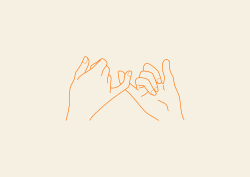Let’s have a chat about miscarriages
It’s the very last thing you want to think about when you get pregnant. Still, a miscarriage is something that all women+ should take into account, certainly in the first 12 weeks of a pregnancy. It’s rare that it is talked about openly. The fact that psychologist and writer Jessica Zucker's Instagram account was declared 'the bravest use of social media' by Women's Health Magazine UK says enough in that respect. After her own miscarriage in 2014, she came up with the hashtag #IHadAMiscarriage, in order to break the taboo. By now, she has gathered almost 45,000 followers, and her account has become a worldwide platform for women who’ve experienced the same thing.
Let’s call it what it is. A miscarriage is nothing more or less than a failed pregnancy in the first trimester of a pregnancy. You can’t do anything about it, as, in most cases, it’s your body intervening on its own, since something is up with the baby. Nature actually does a ‘good’ job, but that doesn’t take away from the fact that it is an incredibly sad event.
In 60% of all cases, the cause of a miscarriage is a so-called ‘predisposition disorder of the fetus’. In the first few weeks of your pregnancy, the embryo produces a huge number of cells. Sometimes, there is a mistake in one of these cells, which causes other cell divisions to go wrong. There can also be a DNA-anomaly, because of which the baby doesn’t have a viable chance of living. The embryo won’t grow any further, and is repelled. Another cause could be that the fertilized egg doesn’t nestle into the uterine wall properly. Usually, it’s impossible to point out a clear cause.
The chance of having a miscarriage
As a pregnancy advances, the risk of a miscarriage reduces greatly. After week 9, a sonographer can already deduce a lot of information from a sonogram, for example if the fetus is growing at the correct rate and if the heart is beating properly. In between week 12 and 16, the chance of a miscarriage is reduced down to 5-8%, and at 16 weeks it goes down even further. At that point the fetus’ organs are almost entirely developed, and the most critical phase is over.
Your age also influences the risk for a miscarriage. After your 35th, the chance increases from 10% to 20%, and after your 40th it is even at 40%. The quality of the ovum reduces after your 40th year, which decreases the case of a spontaneous pregnancy. And something else: being excessively overweight, smoking, stress, excessive coffee- and alcohol use and certain medication can increase the risk of a miscarriage.
After the miscarriage
If the sonogram shows that there is no heartbeat, you have multiple options: waiting for the sprout to come out on its own, using medication that will set contractions into motion, or a suction curettage. In this small gynecological intervention, the doctor will use a sort of spoon to scrape away the pregnancy tissue from your uterus. You can discuss the (dis)advantages with your GP, obstetrician, or gynecologist. Not unimportant: a miscarriage doesn’t say anything about the following pregnancy. Only after three successive miscarriages will you be advised to undergo further tests.
From seventh heaven to an empty belly
That’s the medical part, but there’s also a lot going on on the emotional front after a miscarriage. Fear, anger, guilt, emptiness, reduced faith in your own body, disbelief, the shock of being in seventh heaven and suddenly dropping down to earth with an empty belly, it all plays a part.
A miscarriage can be a difficult and intense experience, which can haunt you for a long time. For one individual it might feel like the loss of a person-to-be, while it can primarily be a view of the future that shatters for another person. Of course, it can also be the case that you have a more level-headed view of it, and don’t really struggle with it all that much.
How do you handle all of those emotions? Some women+ wish to talk about it, while others would rather do anything but that. Experience has shown that it helps to talk to an expert (by experience). They’ll understand what you’re going through, which isn’t always the case when you talk about it with your partner.
Why do you suddenly feel like you’re surrounded by pregnant women+? Of course, you’re terribly happy for them, but still… shit, it just wasn’t meant to be for you. Know that jealousy is just pity that you feel for yourself. In this case that isn’t a negative emotion, but something that you need in order to process it all. Be kind to yourself!
The rules do not apply
It's odd that it’s so terribly easy to prevent a pregnancy, while getting pregnant (and staying pregnant) is so difficult. In the world that we live in today, this can be hard to accept. Many people struggle to understand that the loss of a child who ‘isn’t here yet’ can hurt so badly. Don’t take notice of them, because the weight of the loss isn’t determined by the duration of the pregnancy, but by the meaning that your child already held for you.
Here’s a reading suggestion to finish off with: The Rules Don’t Apply by Ariel Levy. This American journalist of The New Yorker had a miscarriage during a work trip to Mongolia, and wrote an unwrought and honest book about it. She herself said: “I felt like: why doesn’t anybody talk about this? This is an incredibly intense experience that a lot of women have. And when it happens to you there’s no literature about it, there’s very little, so you feel insane. Because you’re grieving so deeply about a baby who wasn’t even really a baby yet. Are you the only one who responds to this experience in this way? The answer is no.”


























